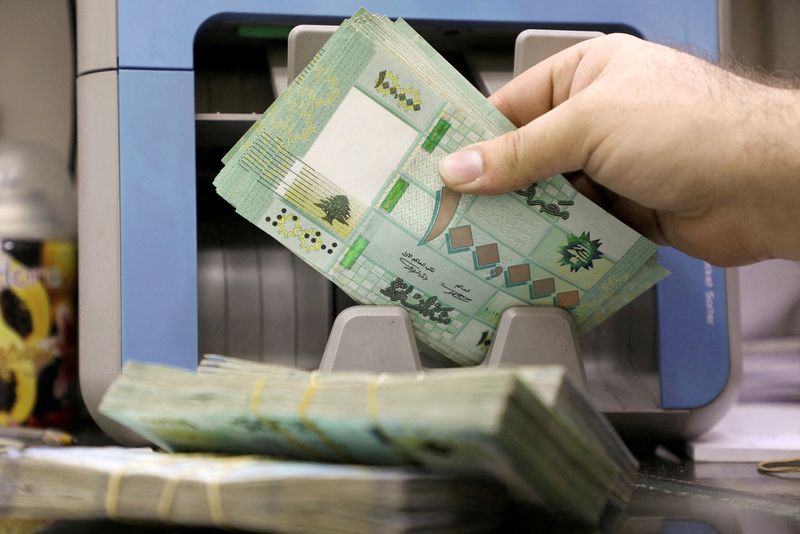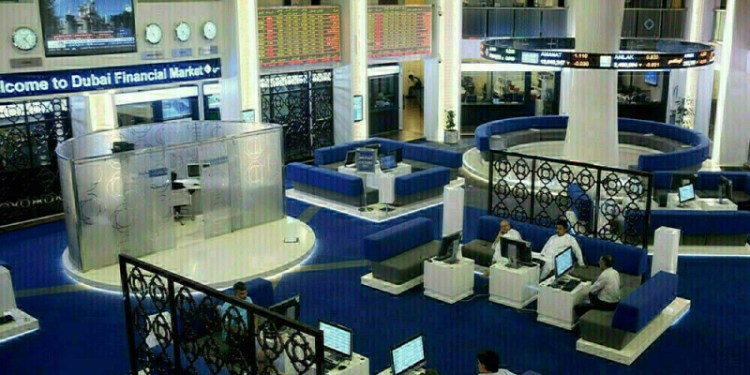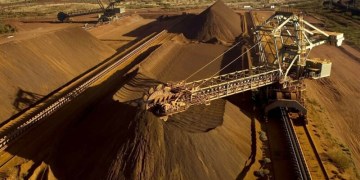
© Reuters. FILE PHOTO: A man counts Lebanese pound banknotes at a currency exchange shop in Beirut, Lebanon, January 5, 2022. REUTERS/Mohamed Azakir/File Photo
By Samia Nakhoul, Tom Perry and Timour Azhari
DUBAI/BEIRUT (Reuters) -Two years into an economic meltdown the World Bank says is one of the worst recorded, Lebanon’s rulers have proposed a way to plug a huge hole in the financial system they were blamed for making: savers will foot most of the bill, not banks or the state.
The plan, seen by Reuters, seeks to revive the moribund banking system by making depositors cover more than half the $69 billion gap, which is three times the size of Lebanon’s economy.
It includes converting a large portion of dollar deposits to Lebanese pounds at rates that wipe out much of their value.
The state, central bank and commercial banks will contribute $31 billion, or less than half.
Agreement on a plan of action is vital for securing an International Monetary Fund bailout and setting the nation on the road to recovery. The new plan needs cabinet approval.
Till now, disputes between politicians and banks about the size of losses and who should pay have stalled any agreement. This latest plan still needs to convince the IMF. But ordinary Lebanese, many driven into poverty, will have little or no say.
“It is the victim that has to bear most of the burden,” said Toufic Gaspard, an economist who has advised the IMF and Lebanese finance ministry. “Their logic is unacceptable by any standard of logic anywhere in the world.”
Savers have faced ‘haircuts’ in other crises around the world, although small depositors are usually protected.
Savers in Lebanon with less than $150,000 will have dollars preserved – amounting to about $25 billion – but, like other depositors, the money will be paid out over 15 years. They have already largely been frozen out of their accounts for two years.
Yet the scale of Lebanon’s crisis, the worst since its 1975-1990 civil war, dwarfs most other global examples. Lebanese government debt was, by some estimates, an eyewatering 500% of gross domestic product in 2021, while the same sectarian leaders who ran the nation into trouble still wield influence now.
‘LITTLE MONEY LEFT’
“There simply is very little money left. This is why accountability is so important. The political leadership is trying to flip the page, close this chapter, without anyone being held to account,” said Mike Azar, an expert on the crisis.
The government, the central bank and the banking association did not respond to emailed requests for comment.
Under the plan, the bulk of dollar deposits of $104 billion – which banks no longer have enough hard currency to cover – will be converted to Lebanese pounds but at a range of exchange rates, with two of them well below current market levels.
Lebanon’s pound has lost more than 90% of its value since the crisis erupted in 2019.
Of those deposits, $16 billion will lose 75% of their value and $35 billion will lose 40%.
“It is an effective nationalisation of deposits,” said Nasser Saidi, a former economy minister and central bank vice governor, blaming the central bank for racking up “massive balance sheet losses” to defend an over-valued currency.
The Lebanese pound, which before the crisis was exchanged at 1,500 to the dollar, now trades around 20,000.
“If accepted by parliament, it would be the kiss of death for a near-zombie banking system and will doom Lebanon, its economy and people to prolonged misery and lost decades,” he said of the latest plan.
ENTRENCHED ELITE
An earlier plan, drawn up in 2020, was torpedoed by banks, the central bank and ruling politicians over objections to the way losses were calculated and shared out. IMF talks collapsed.
The new plan aims to create an Asset Management Company (AMC) to invest deposits in projects such as rebuilding Beirut port – shattered by a huge blast in 2020 – and power stations in a country whose state power plants can’t keep the lights on.
The AMC, to be owned by the state but managed independently, will issue asset-backed securities to pay back depositors, the plan says, aiming to “generate value”.
“A top governance framework is needed to manage all those assets, with no corruption, and the politicians running this country are probably the worst qualified in the world to do this,” said Talal F. Salman, a former finance ministry official.
But there is no sign of a shake-up in Lebanon’s politics that would change the people in charge who are widely blamed for obstructing reforms sought by donors.
Lebanon’s system of power-sharing among Muslim and Christian sects has entrenched the influence of a few individuals, families and groups for decades. Among the most powerful is Hezbollah, the heavily armed, Muslim Shi’ite group backed by Iran.
Under the plan, savings of the wealthiest depositors, amounting to $22 billion, would see $12 billion of deposits turned into Lebanese bank shares. They would also receive a $5 billion perpetual bond.
Banks would contribute $13 billion to plugging the hole, mainly by writing off shareholder capital.
Wealthy depositors could end up owning 72% of the capital in Lebanese banks, unless existing shareholders inject fresh cash.
“There is no dividend or management compensation clawback imposed on the banks and bank management, which is glaringly unfair to depositors,” Azar said.
Source: Investing.com





























